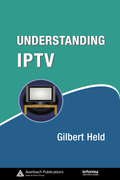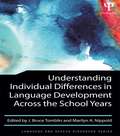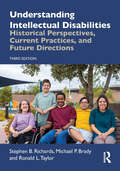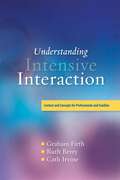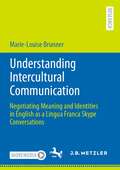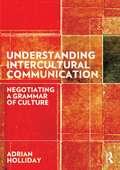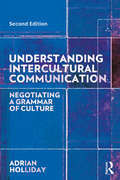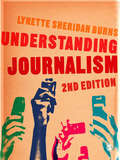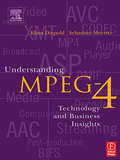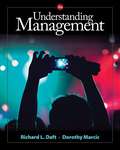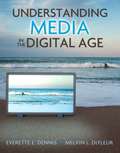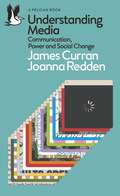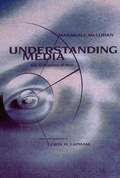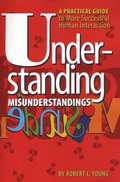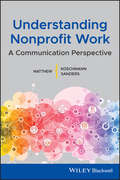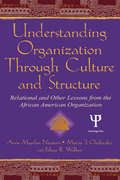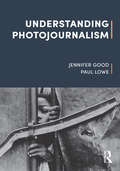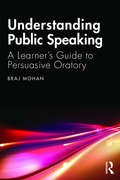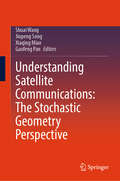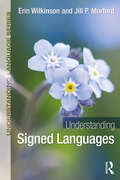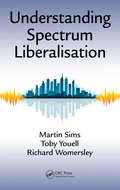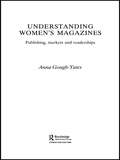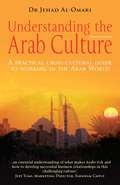- Table View
- List View
Understanding IPTV (Informa Telecoms & Media)
by Gilbert HeldDriven by a combination of technological improvements and commercial pressure, interest in IPTV services has increasingly grown. IPTV refers to the use of the Internet protocol required for delivery of television content. IPTV represents an emerging technology that could change the manner in which homes receive entertainment, personal computers ope
Understanding Im/politeness Through Translation: The English-Greek Paradigm (Advances in (Im)politeness Studies)
by Maria SidiropoulouThis book offers a unique window to the study of im/politeness by looking at a translation perspective, which offers a different set of data and allows further understanding of the phenomenon. In the arena of real-life translation practice, the workings of im/politeness are renegotiated in a different cultural context and thus pragmatically oriented cross-cultural differences become more concrete and tangible. The book focuses on the language pair English and Greek, a strategic choice with Greek as a less widely spoken language and English as a global language. The two languages also differ in their politeness orientation in certain genres, which allows for a fruitful comparison. The volume focuses on press translation first, then translation of academic texts and translation for the stage, and finally audiovisual translation (mainly subtitles). These genres highlight a public, an interactional, and a multimodal dimension in the workings of im/politeness.
Understanding Individual Differences in Language Development Across the School Years
by J. Bruce Tomblin Marilyn A. NippoldThis volume presents the findings of a large-scale study of individual differences in spoken (and heard) language development during the school years. The goal of the study was to investigate the degree to which language abilities at school entry were stable over time and influential in the child’s overall success in important aspects of development. The methodology was a longitudinal study of over 600 children in the US Midwest during a 10-year period. The language skills of these children -- along with reading, academic, and psychosocial outcomes -- were measured. There was intentional oversampling of children with poor language ability without being associated with other developmental or sensory disorders. Furthermore, these children could be sub-grouped based on their nonverbal abilities, such that one group represents children with specific language impairment (SLI), and the other group with nonspecific language impairment (NLI) represents poor language along with depressed nonverbal abilities. Throughout the book, the authors consider whether these distinctions are supported by evidence obtained in this study and which aspects of development are impacted by poor language ability. Data are provided that allow conclusions to be made regarding the level of risk associated with different degrees of poor language and whether this risk should be viewed as lying on a continuum. The volume will appeal to researchers and professionals with an interest in children’s language development, particularly those working with children who have a range of language impairments. This includes Speech and Language Pathologists; Child Neuropsychologists; Clinical Psychologists working in Education, as well as Psycholinguists and Developmental Psychologists.
Understanding Intellectual Disabilities: Historical Perspectives, Current Practices, and Future Directions
by Ronald L. Taylor Stephen B. Richards Michael P. BradyThe third edition provides thorough coverage of the causes and characteristics of intellectual disabilities as well as detailed discussions of the validated instructional approaches in the field today. A revised "Future Directions" chapter explores the most recent philosophical, social, legal, medical, educational, and personal issues that professionals and people with intellectual disabilities face. All chapters have been updated with recent developments in research and the newest terminology being used in the field. This comprehensive and current introductory textbook is ideally suited for introductory or methods courses related to intellectual disabilities.
Understanding Intensive Interaction
by Graham Firth Ruth Berry Cath IrvineIntensive interaction is a valuable approach, with the potential to radically enhance the well-being of difficult-to-reach individuals, such as those with profound and severe learning disabilities, autistic spectrum conditions and emotional problems. This highly accessible book will help families and professionals develop a deeper understanding of this highly-successful approach and its associated issues, resulting in improved communication opportunities within a variety of care, therapeutic and educational settings. This compendium offers a multidisciplinary perspective to intensive interaction, bringing together the authors' experience and research from different disciplines. A glossary format and thematic structure are employed to enable readers to quickly access topics of interest, and gradually build on their understanding of the approach. Each chapter is devoted to an over-arching concept - including psychological theories of human behaviour, relationship building and maintenance and social inclusion - and illustrated with case studies to support theoretical assertions and offer practical examples of useful techniques. A useful reference and reflective tool, this book will interest both family and professional carers, support staff, special education teachers, learning disability nurses, social services practitioners, speech and language therapists, clinical psychologists, occupational therapists, or anyone who is interested in intensive interaction and wants to learn more.
Understanding Intercultural Communication: Negotiating Meaning and Identities in English as a Lingua Franca Skype Conversations
by Marie-Louise BrunnerToday, academics, business professionals and private persons alike need to communicate successfully and establish relationships with people from various cultures through digital means. These skills have now become essential in virtual environments. This book provides an in-depth analysis of how interlocutors negotiate meaning and identities in intercultural video-mediated communication as an important step to improving interactions on a global scale. It contributes to understanding the complex negotiation processes and strategies involved in communicating successfully and in establishing rapport in an intercultural and video-mediated context. Speakers in this English as a Lingua Franca setting act as accomplished conversationalists who efficiently employ various strategies to make themselves understood and to preempt interactional difficulties. At the same time, interlocutors (re)negotiate identities on various levels in the process of their interactions with conversation partners. Based on these insights, this book concludes with practical suggestions for educational and professional applications.
Understanding Intercultural Communication: Negotiating a Grammar of Culture
by Adrian HollidayIn this book, Adrian Holliday provides a practical framework to help students analyse intercultural communication. Underpinned by a new grammar of culture developed by Holliday, this book will incorporate examples and activities to enable students and professionals to investigate culture on very new, entirely non-essentialist lines. This book will address key issues in intercultural communication including: the positive contribution of people from diverse cultural backgrounds the politics of Self and Other which promote negative stereotyping the basis for a bottom-up approach to globalization in which Periphery cultural realities can gain voice and ownership Written by a key researcher in the field, this book presents cutting edge research and a framework for analysis which will make it essential reading for upper undergraduate and postgraduate students studying intercultural communication and professionals in the field.
Understanding Intercultural Communication: Negotiating a Grammar of Culture
by Adrian HollidayUnderstanding Intercultural Communication provides a practical framework to help readers to understand intercultural communication and to solve intercultural problems. Each chapter exemplifies the everyday intercultural through ethnographic narratives in which people make sense of each other in home, work and study locations. Underpinned by a grammar of culture developed by the author, this book addresses key issues in intercultural communication, including: the positive contribution of people from diverse cultural backgrounds; the politics of Self and Other which promote negative stereotyping; the basis for a de-centred approach to globalisation in which periphery cultural realities can gain voice and ownership. Written by a leading researcher in the field, the new edition of this important text has been revised to invite the reader to reflect and develop their own intercultural and research strategies, and updated to include new ideas that have emerged in Holliday’s own work and elsewhere. This book is a key resource for academics, students and practitioners in intercultural communication and related fields.
Understanding Journalism
by Lynette Sheridan BurnsThe new era of Google, Twitter and Facebook has fundamentally shifted the journalist's relationship with the audience. To navigate these new realities, it is imperative for journalism students to master skills in cross-platform writing, and understand the implications on their communication decisions. This second edition of Understanding Journalism tackles these changes head-on. It integrates media and cultural theory with the step-by-step development of writing skills to give students the techniques and the savvy they need to succeed. Bigger and better, this new edition includes: A new chapter on who journalists are in the social media age Reorganization of journalism skills chapters to bring writing and editing to the fore Full coverage and examples on Twitter, social media, SMS formats In-depth exploration of the ethical issues raised by new media platforms All new exercises, case scenarios and further readings It is the essential guide for all students of journalism.
Understanding MPEG 4: Technology and Business Insights
by Sebastian Moeritz Klaus DiepoldThe Practical Guide to MPEG 4 offers an up to date introduction to this important interactive and multimedia compression standard (including MPEG-4 Part 10), with real examples and information as to how and where this new technology should be used. All aspects of MPEG-4 that are relevant in today's technical landscape are described in this book, including video and audio creation, production, distribution, reception and consumption environment. This book explains everything you really need to know in jargon-free language: interactive systems, content management, deployment, licensing and business models.
Understanding Management (Mindtap Course List Series)
by Richard L. Daft Dorothy Marcic<P>Today's managers and organizations are being buffeted by massive and far-reaching social, technological, and economic changes.<P> Any manager who believed in the myth of stability was rocked out of complacency when, one after another, large financial institutions in the United States began to fail, automakers filed for bankruptcy, the housing market collapsed, European economies faced financial challenges, and a global economic recession took hold and wouldn't let go.
Understanding Media in the Digital Age: Connections for Communication, Society, and Culture
by Everette E. Dennis Melvin L. DefleurThe book shows readers how to navigate the world of traditional and new media while fostering an understanding of mass communication theory, history, active research findings, and professional experience.
Understanding Media: Communication, Power and Social Change (Pelican Books)
by James Curran Joanna ReddenAn authoritative and accessible guide to the world’s most influential force – the contemporary media Our lives are more mediated than ever before. Adults in economically advanced countries spend, on average, over eight hours per day interacting with the media. The news and entertainment industries are being transformed by the shift to digital platforms. But how much is really changing in terms of what shapes media content? What are the impacts on our public and imaginative life? And is the Internet a democratising tool of social protest, or of state and commercial manipulation?Drawing on decades of research to examine these and other questions, Understanding Media interrogates claims about the Internet, explores how representations in TV and film may influence perceptions of self, and traces overarching trends while attending to crucial local context, from the United States to China, Norway to Malaysia, and Brazil to Britain. Understanding Media is an accessible and essential guide to the world's most influential force - the contemporary media.
Understanding Media: The Extensions of Man
by Marshall McluhanIn a new introduction to this edition of Understanding Media, Harper's editor Lewis Lapham reevaluates McLuhan's work in the light of the technological as well as the political and social changes that have occurred in the last part of this century.
Understanding Misunderstandings: A Practical Guide to More Successful Human Interaction
by Robert L. YoungHave you ever meant one thing, but said another? Reacted angrily when no offense was intended? Wished that the earth would open up and swallow you? Understanding Misunderstandings will help you get out and stay out of these difficulties. Robert L. Young explains why many common types of misunderstandings arise and how they can be avoided or corrected. In the first part of the book, he breaks the process of misunderstanding down into stages, showing how it can occur when we misspeak, mishear, misinterpret, or react in inappropriate ways. In the second part, he expertly analyzes the kinds of misunderstandings that can arise from differences in culture, social class, race and ethnicity, and gender. Real-life examples illustrate many of the problems and solutions he describes. Because misunderstanding can destroy friendships and marriages, wreck careers, and lead to clashes between whole segments of society, understanding and diffusing it is of the utmost importance. This reader-friendly book provides the practical guidance to do just that. Educators, business people, psychologists, parents-in fact, everyone who interacts with other people-will benefit from it.
Understanding Nonprofit Work: A Communication Perspective
by Matthew L. Sanders Matthew A. KoschmannOffers a valuable resource for scholars, teachers, students, and nonprofit practitioners interested in understanding nonprofit work from a communication perspective This sophisticated yet accessible book explores the dynamics of organizational communication in the context of nonprofit work. It delves deeply into the subjects of communication and social construction and develops several key subject areas and issues including leadership, management, and governance; the marketization of nonprofit work; collaboration and organizational partnerships; meaningful labor; and international nonprofit work. Understanding Nonprofit Work: A Communication Perspective is the first resource to bring together the considerable and voluminous amount of communication scholarship and nonprofit research available in academia. Moving beyond the simplistic notion of communication as merely the transmission of information, it instead develops a more insightful approach to nonprofit work based on the concept of communication as social construction, explaining the implications and applications of this distinct communication perspective in ways that will benefit both communication scholars and nonprofit practitioners. Additionally, this book: Brings together a wealth of information in communication theory and nonprofit organizations in a thoughtful, approachable style Demonstrates the application and utility of a communication perspective across several key aspects of nonprofit work Written by two well-known scholars in the field with considerable experience in nonprofit work—teaching, research, volunteering, consulting, and board membership Understanding Nonprofit Work is an ideal book for advanced undergraduate and graduate level students in courses on nonprofit work, or broader classes on organizational communication and public administration that have units on the nonprofit sector. This book is also perfect for nonprofit professionals looking to develop a more sophisticated and insightful approach to their work.
Understanding Organization Through Culture and Structure: Relational and Other Lessons From the African American Organization (Routledge Communication Series)
by Anne Maydan Nicotera Marcia J. Clinkscales Felicia R. WalkerUnderstanding Organization Through Culture and Structure: Relational and Other Lessons From the African American Organization presents an innovative view of organizations and the communication processes that constitute them. Arguing that human beings are communicatively embedded in their cultures, Anne Maydan Nicotera and Marcia J. Clinkscales, working with Felicia R. Walker, examine issues concerning task and relational orientations and the ways they and other cultural dimensions connect with organizational structure and function for predominantly African American organizations. Utilizing the results of their own research on organizations, they develop a set of humanistically-based models that illustrate how hidden cultural processes suffuse organizational life and are manifest through communication. Emphasizing the development of alternative theories and models of organizing which are rooted in African-American culture, such as team-based versus hierarchy-based interactions, this book explores such organizational functions as leadership and management, power, authority and control, communication and interpersonal dynamics, and cultural identity and human development. Applying their findings in a broader analysis of contemporary practices in organizational restructuring, the authors present research that serves as the foundation for generating several emergent models with significant implications for organizational systems. Understanding Organization Through Culture and Structure stimulates and inspires current researchers of organizational communication, and is certain to raise greater awareness of the operation of culture in organizing. The text is intended for scholars and students in organizational communication, management, organizational psychology, African studies, and related areas.
Understanding Photojournalism
by Paul Lowe Jennifer GoodUnderstanding Photojournalism explores the interface between theory and practice at the heart of photojournalism, mapping out the critical questions that photojournalists and picture editors consider in their daily practice and placing these in context. Outlining the history and theory of photojournalism, this textbook explains its historical and contemporary development; who creates, selects and circulates images; and the ethics, aesthetics and politics of the practice. Carefully chosen, international case studies represent a cross section of key photographers, practices and periods within photojournalism, enabling students to understand the central questions and critical concepts. Illustrated with a range of photographs and case material, including interviews with contemporary photojournalists, this book is essential reading for students taking university and college courses on photography within a wide range of disciplines and includes an annotated guide to further reading and a glossary of terms to further expand your studies.
Understanding Public Speaking: A Learner's Guide to Persuasive Oratory
by Braj MohanPublic speaking is a much coveted yet difficult art. This book illustrates the use of various linguistic devices and persuasive strategies with examples from the speeches of powerful orators in history. It systematically draws on the various approaches to public speaking and persuasive discourse to present new insights and techniques. The volume: Critically examines strategies of persuasive oratory. Draws on extensive investigation of a corpus of famous public speeches in history. Focuses on the needs of those who want to brush up their public speaking skills. The volume will be a key reference for aspiring civil servants, lawyers, business and corporate professionals, and politicians. It will be of great interest to scholars of linguistics, and political and business communication.
Understanding Satellite Communications: The Stochastic Geometry Perspective
by Shuai Wang Gaofeng Pan Xiaqing Miao Jinpeng SongThis book aims to analyze and model satellite communication systems while taking into account the variable transmission performance that occurs due to randomness in space, aerial, and terrestrial terminals. The book covers both conceptual principles and practical engineering applications, with an emphasis on the latter. Readers will gain a deep understanding of several major topics, including satellite-terrestrial communications, satellite-aerial communications, satellite-aerial-terrestrial communications, and terrestrial-satellite-terrestrial communications. A key feature of this book is its comprehensive and systematic treatment of satellite communication issues, making it an ideal resource for anyone interested in learning about various application scenarios in this field. Researchers, engineers, and graduate students in wireless communications, signal processing, and related areas will find this book highly valuable.
Understanding Signed Languages (Understanding Language)
by Jill P. Morford Erin WilkinsonUnderstanding Signed Languages provides a broad and accessible introduction to the science of language, with evidence drawn from signed languages around the world. Readers will learn about language through a unique set of signed language studies that will surprise them with the diversity of ways human languages achieve the same functional goals of communication. Designed for students with no prior knowledge of signed languages or linguistics, this book features: A comprehensive introduction to the sub-fields of linguistics, including sociolinguistics, linguistic structure, language change, language acquisition, and bilingualism; Examples from more than 50 of the world’s signed languages and a brief “Language in Community” snapshot in each chapter highlighting one signed language and the researchers who are documenting it; Opportunities to reflect on how language ideologies have shaped scientific inquiry and contributed to linguistic bias; Review and discussion questions, useful websites, and pointers to additional readings and resources at the end of each chapter. Understanding Signed Languages provides instructors with a primary or secondary text to enliven the discourse in introductory classes in linguistics, interpreting, deaf education, disability studies, cognitive science, human diversity, and communication sciences and disorders. Students will develop an appreciation for the language-specific and universal characteristics of signed languages and the global communities in which they emerge.
Understanding Spectrum Liberalisation
by Martin Sims Toby Youell Richard WomersleyUntil the 1990s, almost all spectrum licenses were given away practically for free-even the first mobile licenses which laid the foundation for multi-billion dollar companies that dominate stock markets around the world. In the past fifteen years, there has been a concerted attempt to liberalise the sector and make it more open to market forces. Th
Understanding Women's Magazines: Publishing, Markets and Readerships in Late-Twentieth Century Britain
by Anna Gough-YatesUnderstanding Women's Magazines investigates the changing landscape of women's magazines. Anna Gough-Yates focuses on the successes, failures and shifting fortunes of a number of magazines including Elle, Marie Claire, Cosmopolitan, Frank, New Woman and Red and considers the dramatic developments that have taken place in women's magazine publishing in the last two decades.Understanding Women's Magazines examines the transformation in the production, advertising and marketing practices of women's magazines. Arguing that these changes were driven by political and economic shifts, commercial cultures and the need to get closer to the reader, the book shows how this has led to an increased focus on consumer lifestyles and attempts by publishers to identify and target a 'new woman'.
Understanding and Translating Chinese Martial Arts (New Frontiers in Translation Studies)
by Defeng Li Dan Jiao Lingwei Meng Yuhong PengThe present book features some introductory discussions on martial arts for the international audience and highlights in brief the complexities of translating the genre into English, often from a comparative literature perspective. Martial arts, also known as Kungfu or Wushu, refer to different families of Chinese fighting styles over many centuries. Martial arts fiction, or Wuxia literature, is a unique genre that depicts adventures of martial artists in ancient China. Understanding martial arts and the Chinese culture and philosophy behind them creates an intriguing experience, particularly, for non-Chinese readers; translating the literature into English poses unparalleled challenges for translators not only because of the culture embedded in it but also the fascinating martial arts moves and captivating names of many characters therein.
Understanding the Arab Culture, 2nd Edition: A Practical Cross-cultural Guide To Working In The Arab World
by Jehad Al-OmariUnderstanding the Arab Culture is a thoroughly practical crosscultural guide to working with Arab cultures, written with theWesterner in mind.The book focuses more on the key differences than similarities, issues that Westerners will find puzzling, unusual or difficult to cope with. It is based on years of experience of lecturing to Westerners and a long list of frequently asked questions. It addresses Western perceptions and misconceptions of Arabs, Islam and the Arab world as well as some key Arab perceptions of the West. Many practical tips are given on a variety of issues, from exchanging appropriate gifts to negotiating techniques.Contents: Preface; About the author; Acknowledgements; Introduction; 1. A cross-cultural Perspective; 2. Ten cross-cultural realities; 3. The Arab culture in a generic context; 4. The business pyramid; 5. An Arab perspective; 6. First encounters with Arabs; 7. Values and attitudes; 8. Experiencing Arabia; 9. Islam: away of life; 10. Doing business; Epilogue; Recommended reading; Index.
